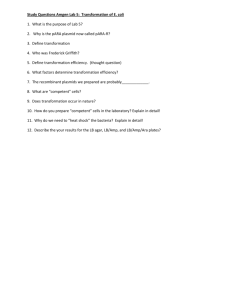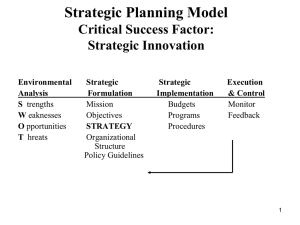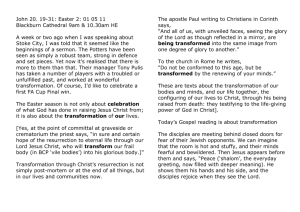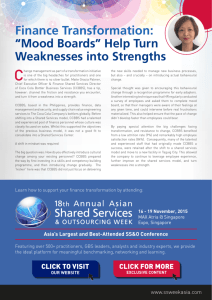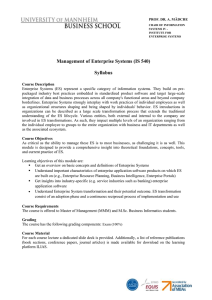File - Grace Episcopal Church
advertisement
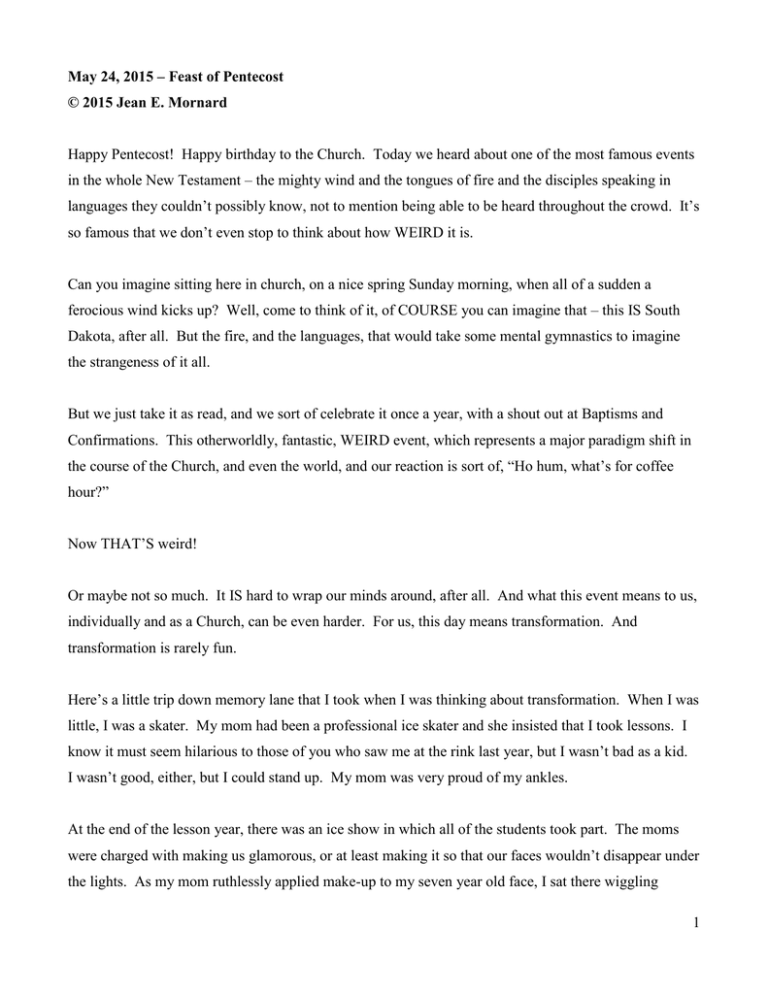
May 24, 2015 – Feast of Pentecost © 2015 Jean E. Mornard Happy Pentecost! Happy birthday to the Church. Today we heard about one of the most famous events in the whole New Testament – the mighty wind and the tongues of fire and the disciples speaking in languages they couldn’t possibly know, not to mention being able to be heard throughout the crowd. It’s so famous that we don’t even stop to think about how WEIRD it is. Can you imagine sitting here in church, on a nice spring Sunday morning, when all of a sudden a ferocious wind kicks up? Well, come to think of it, of COURSE you can imagine that – this IS South Dakota, after all. But the fire, and the languages, that would take some mental gymnastics to imagine the strangeness of it all. But we just take it as read, and we sort of celebrate it once a year, with a shout out at Baptisms and Confirmations. This otherworldly, fantastic, WEIRD event, which represents a major paradigm shift in the course of the Church, and even the world, and our reaction is sort of, “Ho hum, what’s for coffee hour?” Now THAT’S weird! Or maybe not so much. It IS hard to wrap our minds around, after all. And what this event means to us, individually and as a Church, can be even harder. For us, this day means transformation. And transformation is rarely fun. Here’s a little trip down memory lane that I took when I was thinking about transformation. When I was little, I was a skater. My mom had been a professional ice skater and she insisted that I took lessons. I know it must seem hilarious to those of you who saw me at the rink last year, but I wasn’t bad as a kid. I wasn’t good, either, but I could stand up. My mom was very proud of my ankles. At the end of the lesson year, there was an ice show in which all of the students took part. The moms were charged with making us glamorous, or at least making it so that our faces wouldn’t disappear under the lights. As my mom ruthlessly applied make-up to my seven year old face, I sat there wiggling 1 around and complaining that it hurt. My mom told me sternly, “It hurts to be beautiful!” Transformation often hurts. But think about what would happen without transformation. Without it, caterpillars would simply die in their chrysalis phase without ever growing wings. Without it, there would be some pretty unhappy mothers to be, as their babies never leave the fetus stage and are never born. And without it, the Church would have never moved beyond that tiny group of frightened and sad people huddling in that upper room in Jerusalem. In our Gospel today, Jesus tells his disciples that the Advocate is coming. The word used here for Advocate is paraklétos. It’s an unusual word. It’s used only five times in the entire New Testament and four of those are in the Gospel of John. The other time is in the first epistle of John, which many scholars believe was written by the same person as the Gospel. Paraklétos is translated variously as advocate, intercessor, consoler, comforter, and helper, but it’s a compound word that literally means one who is called beside another, or called to another’s aid. The Holy Spirit is seen as the main actor in the drama of the second chapter of Acts, but in reality the action is being done by the Apostles with the Spirit by their sides and the power of the Spirit at their command. Before I get into too much theological trouble though, these actions are only possible through the transformation of the Apostles through the power coming from God through the Holy Spirit. And what a transformation! Jesus’ disciples went from hiding and not knowing what to do next, to powerhouses of evangelism – literally on fire for the Gospel. Peter went from being someone who denied that he knew Jesus at the first sign of trouble, to a stirring and fearless preacher, unafraid of Romans and Jewish religious authorities alike. And then, not too much later, they spread out to the corners of the known world to preach the Gospel, make disciples, and baptize in the name of the Trinity. But this transformation didn’t come without cost or without pain. Many of Jesus’ followers were persecuted and exiled or imprisoned in those first years. They suffered financial setbacks, in spite of pooling their resources and sharing the money among them. And many were martyred, in wave after wave as the various Roman emperors tried to figure out what to do with them. 2 And then, seventeen hundred-ish years ago, another transformation happened. Constantine, on his way to becoming emperor, saw the sign of the chi-rho in the sky – the first two letters of Christ – and had a dream where Jesus told him that under that sign he would be victorious – in hoc signo vinces. Sure enough, carrying the sign on shields and banners, he won the battle of the Milvian Bridge and became Emperor of Rome. As soon as he got settled in, he created the Edict of Milan, which not only stopped the persecution of Christians, but gave them special status in the Roman Empire. Almost overnight, the Church went from a small group of persecuted folks who met in secret, to a political force to be reckoned with. Looking back at the history of the Church, some people say this wasn’t necessarily a good thing, but there’s nothing we can do about it now. Over the years, there were many small transformations such as the spread of Christianity throughout Europe often at the point of a sword, the rise of the monasteries, the beginning of other groups outside of the established Church, and the split of the Eastern and the Western Churches. And then in the 16th century, an unknown Augustinian monk named Martin Luther nailed ninety-five critiques of the Roman Catholic Church to a church door in Wittenburg and the Reformation was off and running. This next great transformation was also not without its pain and suffering, since several wars came about as a result. Once again, between then and now, there were several more paradigm shifts of various size and influence, but this is threatening to turn into a history lesson so let’s fast forward to now. Today I believe we are heading into another period of transformation that might spell the end of this version of our Church as we know it. If you pay attention to Church news at all, you will probably have heard about the just-released results of a huge study done by the Pew Research Center. Here’s the opening paragraph: The Christian share of the U.S. population is declining, while the number of U.S. adults who do not identify with any organized religion is growing, according to an extensive new survey by the Pew Research Center. Moreover, these changes are taking place across the religious landscape, affecting all regions of the country and many demographic groups. While the drop in Christian 3 affiliation is particularly pronounced among young adults, it is occurring among Americans of all ages. The same trends are seen among whites, blacks and Latinos; among both college graduates and adults with only a high school education; and among women as well as men. Using a gajillion charts and graphs to illustrate, the summary of this study lays out how the religious landscape is changing in the United States. And the news isn’t good. People are leaving the Church in flocks, all over the map – progressive and conservative, evangelical and mainline Protestant, and Roman Catholic. And it seems like just as many aren’t signing up at all, or identify as agnostic or atheist. The reason I say it spells the end of our Church as we know it, or at least the beginning of the end, which I know sounds a little dire, is that it’s clear that we can’t just go on as usual. Gone are the days where it means political or occupational suicide if you don’t belong to a church. Gone are the days when calling yourself an atheist brought stigma and shame with it. Gone are the good old days, or maybe the bad old days. We have to transform ourselves. And what we have to transform ourselves into is a modern version of that second chapter of Acts church. We have to be on fire for God and for spreading the Gospel. This is not in order to bring more people. That ship has sailed, I’m afraid. This is because no matter how many of US there are, there are still more who need to hear the good news of Jesus Christ. Our Great Commission hasn’t gone away just because there are fewer of us to carry it out. Remember, there were only twelve in the beginning. This transformation probably won’t be easy. For some churches it might mean closing the double red doors for good on their old expensive buildings. For some it might mean breaking away from the traditional Sunday morning services. I don’t know what it will look like for us here at Grace, but I expect that it won’t be easy because change never is. It will take all of our hearts, our minds, and our spirits to bravely walk down this new road. But remember, we’re not walking down that road alone. Jesus has sent the Holy Spirit – our Advocate, Comforter, and Guide – to walk beside us. And Paul, in his letter to the Romans, tells us that even when we’re at our lowest ebb and at our most discouraged, even when we don’t know how to pray, the Spirit is there directly interceding on our behalf with the Father, with sighs too deep for words. 4 It might not always be fun, this new journey, but it will be exciting. Exciting and fulfilling and Spirit filled and fueled. As Billy Joel put it: We didn't start the fire It was always burning Since the world's been turning. We didn’t start this fire – God did. But we’re here to carry it forward into a new age. Happy Birthday to us! Amen. 5


